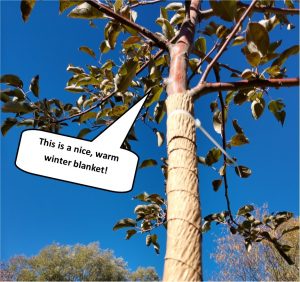
Sometimes it would be nice to have a plant tell you, quite clearly, what is troubling it. Unfortunately, plants don’t speak English but they frequently use a botanical sign language. Be careful though, their sign language is tricky! A wilted plant may be dry or it may have too much water. If the plants could speak for themselves, here’s some things they would like to tell you.
- The younger a plant is the more likely it is to suffer from cold damage during the winter. Young trees can be badly damaged by sunscald – which is a splitting of the bark caused by rapid fluctuations in temperature. Help them adjust by wrapping the trunk with tree wrap from Halloween to Easter for the first 3 years. For more information about sunscald, see this information sheet from CSU extension. Zip ties work well to secure the wrap; duct tape does not.
- Young evergreen trees get thirsty and dry during the winter months. You can help them stay hydrated by applying an anti-desiccant such as Wilt-Pruf for their first few years. Conifers kept in containers and Arborvitae trees also appreciate the extra protection of an anti-desiccant their entire lives. Be sure to apply when temperatures are above freezing.
- Roses also appreciate some preparation for the winter months. Cut canes back to about 18-24″ to avoid breakage caused by heavy snow. If the rose is a hybrid tea rose or another grafted rose, mound mulch around the base to protect the grafting wound or use a rose collar.
- Plants need water even during the cold winter months! If we don’t get a significant amount of snow, drag the hose around and water your woody plants about once a month through the winter.
- Landscape plants often complain that they don’t have enough available nutrients. Now is a great time to amend your soil with 2-3″ of compost. The soil microbes will work their magic even in the cold weather and your soil will be ready for spring.
- You’ve probably been told not to water your plants with hot water, but indoor houseplants actually prefer tepid water to cold water. These plants are typically tropical plants which prefer a warmer, wetter climate and watering with warm water is comforting to their roots.
Are your plants trying to say something but you don’t understand them? Perhaps I can interpret! Send me an email, call or text me at (970)988-3808 to chat about your plants.

